Sam Gin. White man catchee plenty money; Chinaman catchee little money.
Ah Coy. By and by white man catchee no money; Chinaman catchee heap money; Chinaman
workee cheap, plenty work; white man workee dear, no work–sabee?
Sam Gin. He heep sabee.
Ah Coy. Chinaman plenty work, plenty money, plenty to eat. White man no work, no money,
die–sabee?
Sam Gin. Me heep sabee.
www.ck12.org
80
Ah Coy. White man damn fools; keep wifee and children–cost plenty money; Chinaman no
wife, no children, save plenty money. By and by, no more white workingman in California; all
Chinaman–sabee?
( Enter Frank Blaine.)
Frank B. Damn such luck; can’t borrow a cent to save my life. Money is getting as scarce as
flies about Christmas. I must have some. Losing three games of billiards, one after the other,
with this flat-footed Jack Flint is a shame. ( To Ah Coy.) Why don’t you work?
Ah Coy. Your mother no payee me last month; no payee, no workee–sabee?
Frank B. How much does she owe you?
Ah Coy. Six dollars.
Frank B. All right, John; I get it for you. ( Aside.) If I squeeze the six dollars out of the old man that Chinaman has to pay me commission, that’s business (pulling Sam Gin by the queue).
Exit.
Sam Gin. Damn hoodlum. What for you foolee me all the time?
Question:
1. If this document were your ONLY piece of evidence, how would you answer the question: ‘Why did
Americans pass the 1882 Chinese Exclusion Act?’
The Chinese Question – Nast
Source: The cartoon was drawn by Thomas Nast for Harper’s Weekly, a Northern magazine. In this
cartoon, we see Columbia, the feminine symbol of the United States, protecting a Chinese man against a gang of Irish and German thugs. At the bottom it says “Hands off-Gentlemen! America means fair play for all men.” (Figure 6.2).
Question:
1. If this document were your ONLY piece of evidence, how would you answer the question: ‘Why did
Americans pass the 1882 Chinese Exclusion Act?’
Workingmen of San Francisco
Source: “An Address From the Workingmen of San Francisco to Their Brothers Throughout the Pacific
Coast.” An excerpt from a speech to the workingmen of San Francisco on August 16, 1888.
We have met here in San Francisco tonight to raise our voice to you in warning of a great
danger that seems to us imminent, and threatens our almost utter destruction as a prosperous
community.
The danger is, that while we have been sleeping in fancied security, believing that the tide
of Chinese immigration to our State had been checked and was in a fair way to be entirely
stopped, our opponents, the pro-China wealthy men of the land, have been wide-awake and
have succeeded in reviving the importation of this Chinese slave-labor. So that now, hundreds
and thousands of Chinese are every week flocking into our State.
81
www.ck12.org
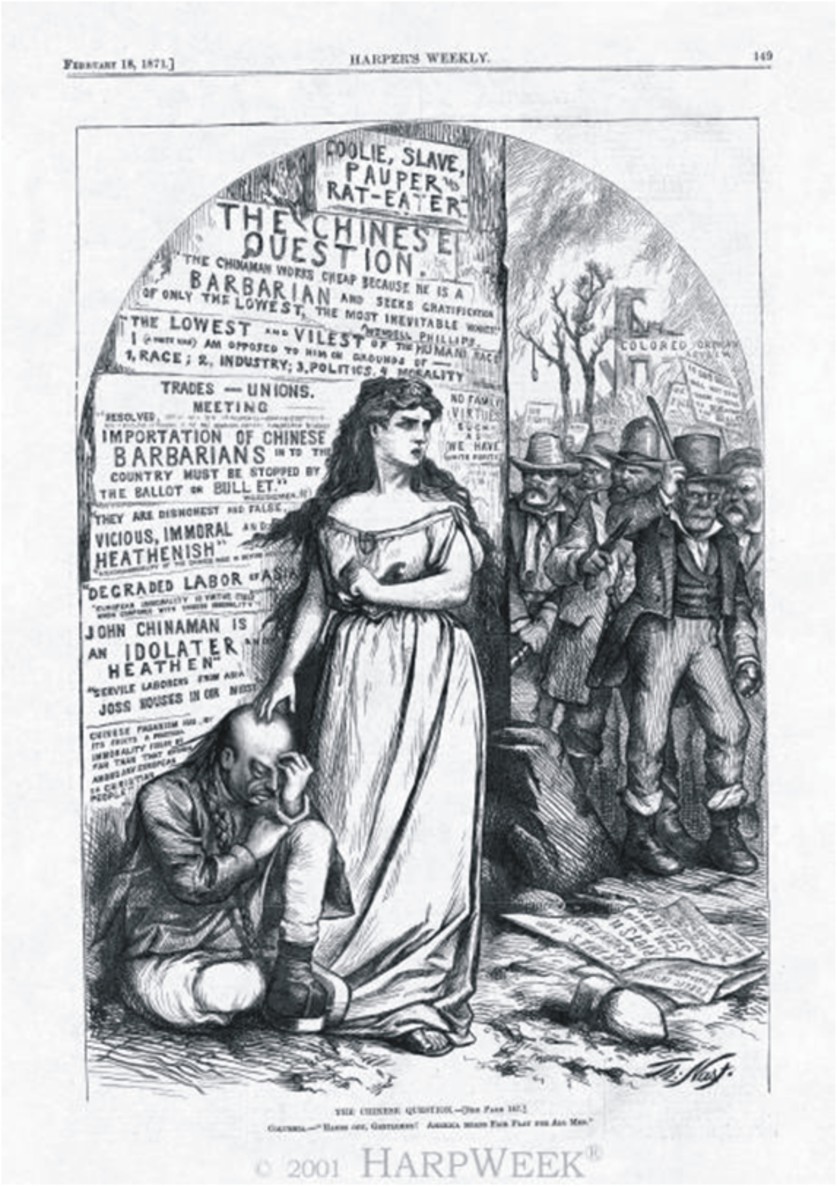
Figure 6.2: “Hands off-Gentlemen! America means fair play for all men.”
www.ck12.org
82
Today, every avenue to labor, of every sort, is crowded with Chinese slave labor worse than it
was eight years ago. The boot, shoe and cigar industries are almost entirely in their hands. In
the manufacture of men’s overalls and women’s and children’s underwear they run over three
thousand sewing machines night and day. They monopolize nearly all the farming done to
supply the market with all sorts of vegetables. This state of things brings about a terrible
competition between our own people, who must live as civilized Americans, and the Chinese,
who live like degraded slaves. We should all understand that this state of things cannot be
much longer endured.
Vocabulary
Imminent about to happen
Question:
1. If this document were your ONLY piece of evidence, how would you answer the question: ‘Why did
Americans pass the 1882 Chinese Exclusion Act?’
6.3 Friends of the Indian
Some Americans tried to remove Native Americans from their land, but others wanted to help “civilize”
them. One group founded to accomplish this, the Friends of the Indian, opened schools to educate and
Europeanize the Indians. As you read these documents, think about whether members of the group were
truly “friends” to the Indians they helped. Were they well-intentioned? Did their work make the Indians better off?
Diaries of Alice Fletcher
Source: Alice Fletcher was an ethnologist (someone who studies and compares the language, religion, customs, and culture of groups of people). In the 1880s she lived among a number of Native American tribes to learn about their customs. She became a founder of the “Friends of the Indians.” In the diary entries below, she writes about her experiences on the Sioux Reservation in 1881.
October 5, 1881
Wednesday A.M. Rainy again and we can’t get on. Buffalo-chip is a Medicine man, has little
positive humor, rather sober and dignified. A queer childish consciousness. This morning he
took a stick and with queer mumblings, he raised it to and fro. This was to gain better weather.
It is a strange thing to sit and witness actual heathen performances. One realizes the power
and gift of spiritual life by the blessed Lord. I needed to see all this to realize the truth of “I
am the way, the truth and the life”. The darkness and poverty of their mental life is pitiful….
This A.M. I have been teaching Wajapa more arithmetic, trying to make the figures clear to
him. One feels so sorry for them, so longs to broaden and deepen and brighten their life.
October 15, 1881
An old Indian sat there and when we came in, said, “How you do?” and extended his hand.
Quite polite to give his sole English.
83
www.ck12.org
White Thunder was on the bed. He was not very friendly toward me, I thought. We all sat on
chairs. Several other Indians there, two young men and an old man. Swift Bear came in and
stayed.
While we sat there, White Thunder’s wife began to cook. She made bread and baked it, terrible
stuff, heavy and poor. Coffee and some sort of stripped and dried meat boiled with pork. A
cloth was put on the floor between White Thunder’s bed and the stove and the meal served on
china plates and cups and saucers.
A young pretty girl came in, brought in meat and looked bright and pleasing. This was the
wife’s younger sister, had been at Carlisle school. She is about eighteen years old.
I understand that White Thunder wants to marry this girl as his second wife. She declines. It
is rather startling and unpleasant to think about this woman’s future. I hope she will hold out.
After the meal, White Thunder began his speech. It seemed to me that the speech lacked in
friendliness. He wanted to know what we were here for.
I said that I had their good at heart. I had heard that this summer many of the children were
coming home from the eastern schools. These children can all speak English and understand
figures. Now what I propose is that the chiefs and the leading men will spend a part of every
day with some of the children and learn the meaning and use of figures and master as much
English as possible. If they can learn but little, that little will help them to protect themselves
against the white men who wish to cheat them.
Swift Bear received this with interest. White Thunder did not say a word. This visit was rather
uninteresting. I felt the influence of White Thunder to be less single and noble, in some ways.
They want to go to work but have nothing to go to work with - want cattle, chickens, hogs to
raise as on a farm. They have nothing - they want to go to work, &c. &c.
October 27, 1881
Called on Sitting Bull Oct. 27, 1881, about 12.30 P.M. He received me with much state, sitting
at the left of his tent. Some 13 of his men came in, several old ones.
Sitting Bull explained that has thrown away the old ways and desires to make his way toward
civilization. He wants for the sake of the women, to turn away from the old ways. The game
[buffalo] gone, he wants to walk in the way of work. For themselves, they can’t change but for
their children and the future they want to change their life.
They want to go to work but have nothing to go to work with - want cattle, chickens, hogs, to
raise on a farm.
Questions:
1. Sourcing: Who wrote this doucment? What is her perspective? Who is the audience?
2. Contextualization: How does Alice Fletcher see the world? What was happening to Native Amer-
icans at this time?
3. Do you trust the document? Why or why not?
“School Days of an Indian Girl” – Zitkala-Sa
Source: The excerpt below was written by Zitkala-Sa, or Red Bird, a Sioux from a reservation in South Dakota. (Her English name was Gertrude Simmons Bonnin). She describes her experiences at age 8 in a school for Native Americans. She ultimately attended college and then began a lifetime of work to improve the lives of Native Americans. The excerpt below was published in the Atlantic Monthly in 1900.
www.ck12.org
84
Late in the morning, my friend said she had overhead the paleface woman talk about cutting our
long, heavy hear. Our mothers had taught us that only unskilled warriors who were captured
had their hair cut by the enemy. Among our people, short hair was worn by mourners and by
cowards!
I watched my chance and when no one noticed I disappeared....On my hands and knees I crawled
under the bed and cuddled myself in a dark corner.
Women and girls entered the room. I held my breath and watched them open closet doors and
peep behind large trunks. What caused them to snoop and look under the bed I do not know.
I remember being dragged out, though I resisted by kicking and scratching wildly. In spite of
myself, I was carried downstairs and tied fast in a chair.
I cried aloud, shaking my head all the while until I felt the cold blades of the scissors against
my neck, and heard them gnaw off one of my thick braids.
Then I lost my spirit. Since the day I was taken from my mother I had suffered extreme
indignities. In my anguish I moaned for my mother, but no one came to comfort me. Not a
soul reasoned quietly with me, as my own mother used to do; for now I was only one of many
little animals driven by a herder.
Question:
1. Sourcing: Who wrote this document? What was their audience? How trustworthy is it?
Section Question:
1. Based on both documents, were the Friends of the Indian well-intentioned? Were they truly “friends
of the Indian?”
6.4 Jacob Riis
How the Other Half Lives – Jacob Riis
Source: Excerpts from Jacob Riis’s book How the Other Half Lives, 1890. Jacob Riis was a “muckraker”
who photographed poverty in New York City’s slums in the 1880s. Riis tried to improve the conditions for the poor by making richer people aware of how the poor lived.
The Italian in New York
The Italian comes in at the bottom. In the slums he is welcomed as a tenant who “makes less
trouble” than the Irishman: is content to live in a pig-sty and lets the rent collector rob him.
Ordinarily he is easily enough governed by authority—except for Sunday, when he settles down
to a game of cards and lets loose all his bad passions. Like the Chinese, the Italian is a
born gambler. His soul is in the game from the moment the cards are on the table, and very
frequently his knife is in it too before the game is ended.
Chinatown
Red and yellow are the holiday colors of Chinatown, but they do not lend brightness in Mott
Street... Rather, the colors only add a general dullness. Whatever happens in Chinatown goes
on behind closed doors in stealth and secretiveness. His business, as his domestic life, shuns
85
www.ck12.org
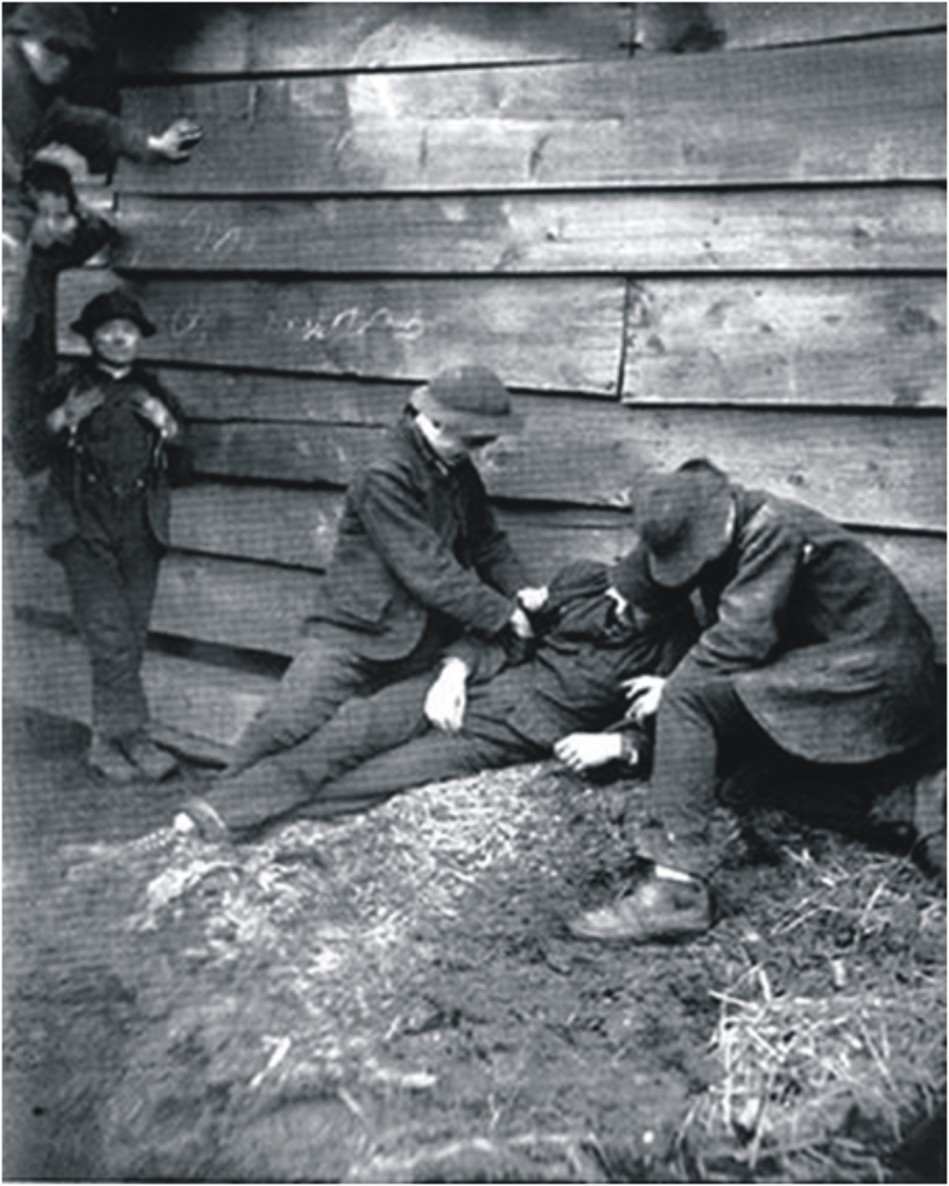
the light, less because there is anything to conceal than because that is the way of the man.
The stranger who enters through the doorway is received with sudden silence, a sullen stare,
and an angry “Vat you vant?” that breathes annoyance and distrust.
Jewtown
Poverty always goes along with dirt and disease, and Jewtown is no exception. The managers
of the Eastern Dispensary, which is in the very heart of their district, told the whole story when
they said: “The diseases these people suffer from are not due to intemperance or immorality,
but to ignorance, want of suitable food, and the foul air in which they live and work.” The
homes of the Hebrew quarter are its workshops also.... Every member of the family, from the
youngest to the oldest, works, shut in the stuffy rooms, where meals are cooked and clothing
washed and dried besides, all day long. It is not unusual to find a dozen persons–men women,
and children–at work in a single small room.... It has happened more than once that a child
recovering from small-pox, and in the most contagious stage of the disease, has been found
crawling among heaps of half-finished clothing that the next day would be offered for sale on
the counter of a Broadway store…
Source: Riis’s caption for this image is “Growler Gang in Session (Robbing a Lush).” (Figure 6.3).
Figure 6.3: “Growler Gang in Session (Robbing a Lush).”
Source: Riis’s caption for the following photo was “Street Arabs in Sleeping Quarters.” It was taken at some time during the 1880s and included in How the Other Half Lives. (Figure 6.4).
Section Questions:
Use both the text and photographs to answer these questions.
1. Sourcing: Who created these documents? What was his purpose in writing? Who do you think
was his audience?
2. Do the photographs look natural to you or posed?
3. Close Reading: What is Riis’s attitude toward the people he writes about? Cite specific phrases to support your answer.
www.ck12.org
86
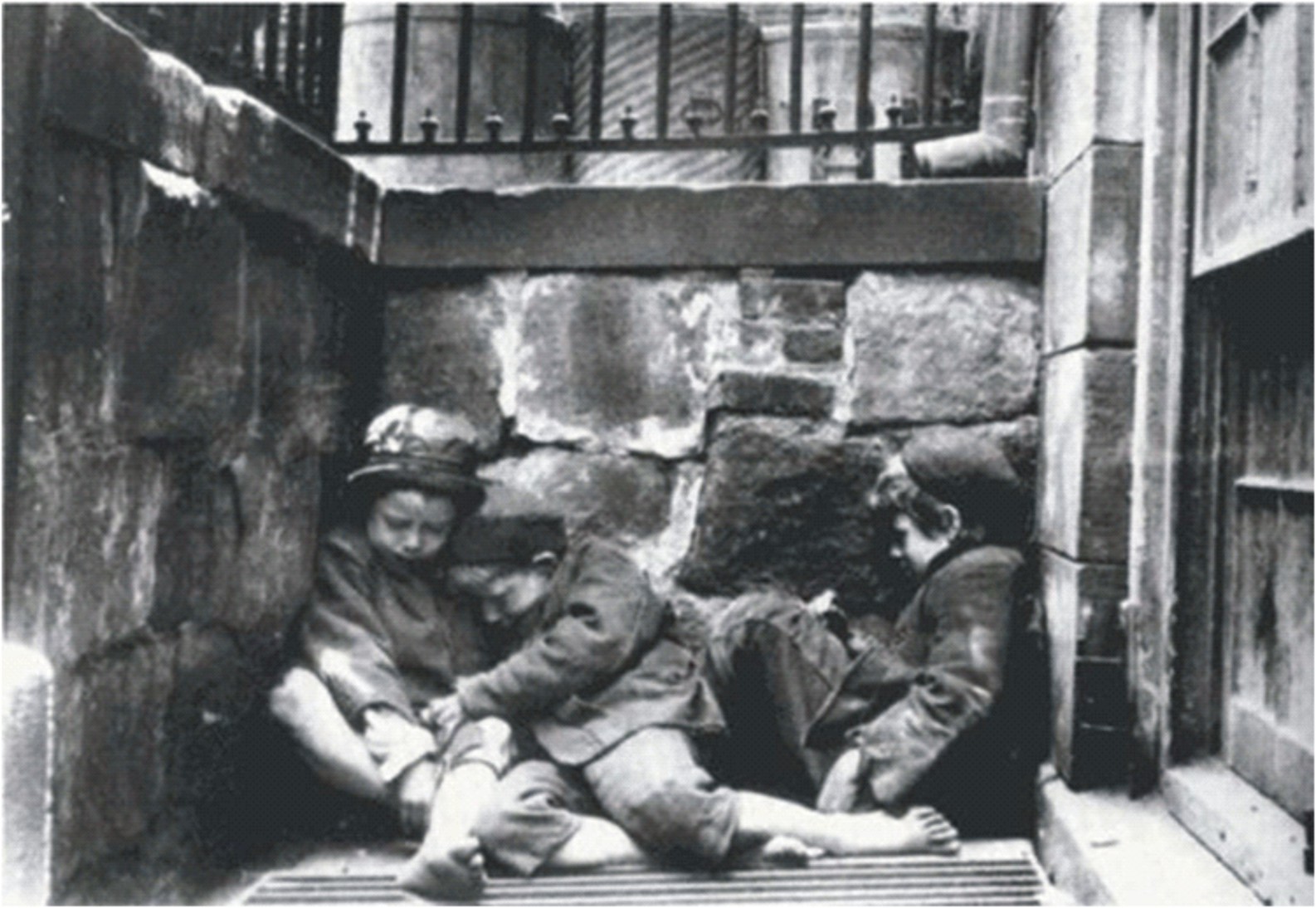
Figure 6.4: “Street Arabs in Sleeping Quarters”
4. Is there a contradiction between Riis’s purpose in writing and his view of ethnic communities? Explain why or why not.
6.5 Populism
In the decades following the Civil War, the prices of agricultural crops fell and life became very hard for farmers in the American West, who struggled to make a living. They established a series of organizations to represent their interests, including The Grange in 1867 and the Farmers’ Alliance in 1876. The most successful organization, founded in 1892 was the Populist Party, a political group intended to promote farmer-friendly legislation. The Populists gained adherents in the South in addition to the West and
nominated competitive presidential candidates in 1892 and 1896. However, the party failed to appeal
to urban working people and never achieved a majority. As the new century dawned, the Populist Party
weakened and eventually disbanded. The documents below show the range of motivations behind Populism,
including temperance, economic distress, and racism.
Speech to the Women’s Christian Temperance Union - Mary Eliz-
abeth Lease, 1890
Source: Speech by Mary Elizabeth Lease to the Women’s Christian Temperance Union, 1890.
Lease
became politically involved as a speaker for the rights of workers and farmers. She had powerful voice and charismatic speaking style. The Women’s Christian Temperance Union was a women’s movement against
alcohol.
The mightiest movement the world has known in two thousand years... is sending out the
happiest message to oppressed humanity that the world has heard since John the Baptist came
preaching in the wilderness that the world’s Redeemer was coming to relieve the world’s misery.
To this sterile and remote region, infested by savage beasts and still more savage men, the
women of the New England States, the women of the cultured East, came with husbands, sons
and brothers to help them build up a home.... We endured hardships, and dangers; hours of
loneliness, fear and sorrow... We toiled in the cabin and in the field; we helped our loved ones
to make the prairie blossom...
Yet, after all our years of toil and deprivation, dangers and hardships, our homes are being
taken from us by an infamous [wicked] system of mortgage foreclosure. It takes from us at the
rate of five hundred a month the homes that represent the best years of our life, our toil, our
hopes, our happiness. How did it happen? The government, siding with Wall Street, broke its
87
www.ck12.org
contracts with the people.... As Senator Plumb [of Kansas] tells us, “Our debts were increased,
while the means to pay them [cash] was decreased.”
No more millionaires, and no more paupers; no more gold kings, silver kings and oil kings,
and no more little waifs of humanity starving for a crust of bread. We shall have the golden
age of which Isaiah sang and the prophets have so long foretold; when the farmers shall be
prosperous and happy, dwelling under their own vine and fig tree; when the laborer shall have
that for which he toils... When we shall have not a government of the people by capitalists,
but a government of the people, by the people.
Ladies and gentlemen, I thank you.
Questions:
1. Sourcing: Who wrote this document? When? Who was the intended audience?
2. Contextualization: What was happening for farmers at the time this document was written? To
what extent were women involved in politics at this time?
3. Close reading: How did Lease want to make her audience feel? What specific passages show this?
Cross of Gold - William Jennings Bryan
Source: Speech delivered by William Jennings Bryan at the Democratic National Convention in July 1896.
It is considered one of the most famous speeches in American history. The passage below is an excerpt.
A 1925 recording of Bryan reading the speech is available at http://historymatters.gmu.
edu/d/5354/.
The merchant at the corner store is as much a businessman as the merchant of New York. The
farmer who goes forth in the morning and toils all day...is as much a businessman as the man
who [works on Wall Street].
We come to speak for this broader class of businessmen....
It is for these that we speak. We are fighting in the defense of our homes and our families. We
have petitioned, and our petitions have been scorned. We have entreated, and our entreaties
have been disregarded. We have begged, and they have mocked us.
We beg no longer; we entreat no more; we petition no more. We defy them!
You come to us and tell us that the great cities are in favor of the gold standard. I tell you
that the great cities rest upon these broad and fertile prairies. Burn down your cities and leave
our farms, and your cities will spring up again as if by magic. But destroy our farms and the
grass will grow in the streets of every city in this country.
Having behind us the commercial interests and the laboring interests and all the toiling masses,
we shall answer their demands for a gold standard by saying to them: you shall not press down
upon the brow of labor this crown of thorns. You shall not crucify mankind upon a cross of
gold.
Questions:
1. Sourcing: Where is Bryan speaking? What is the purpose of his speech?
2. Context: Based on the speech, how do you think farmers and workers were feeling about business and industry? Find a quote to support your answer.
www.ck12.org
88
3. Close reading: What is the main point of his speech?
4. Close reading: What makes the speech so powerful? Pick the line that you think is most powerful and explain your choice.
Section Questions:
1. How are Bryan’s speech and Lease’s speech similar? How are they different?
2. Why do you think speakers like Lease and Bryan were so popular with farmers in the 1890s?
A White Man’s Day – Raleigh News and Observer
Source: The following article appeared in the Democratic newspaper, News and Observer, on October 21, 1898. (Figure 6.5).
The article describes a speech by Democratic Senator Ben Tillman who was convincing the large crowd to vote Democratic in the upcoming election.
A WHITE MAN’S DAY.
Eight to Ten Thousand People Listen.
TILLMAN MAKES A GREAT SPEECH FOR DEMOCRACY
Tillman said that he could not understand why whites in North Carolina did not use their
large majority to prevent negro domination. He blamed both Democrats and Populists for their
continued division, but appealed to the Populists to re-unite with the Democrats. When they
had restored white rule, they would have plenty of time to settle their differences. By taking
his advice the Populists would reinforce the silver-backed dollar and help keep the Republican
goldbugs from making policy.
The crowd yelled with delight at every attack on the Republicans.
Questions:
1. Sourcing: What party does Tillman represent?
2. Sourcing: Who is he trying to convince to vote Democratic?
3. Close Reading: What are two things that Tillman promises will happen if the Democrats win?
How Long Will This Last? – Raleigh News and Observer
Source: The following political cartoon appeared in the Democratic newspaper, News and Observer, on August 13, 1898. (Figure 6.6).
Populist Speech - Gov. Daniel Russell
Source: The following speech was published in a Populist newspaper on October 26, 1898. In this speech, Republican Governor Russell declares that he wants the election to be peaceful. (Figure 6.7).
I have been told that several political meetings have been broken up by armed men, using
threats, intimidation, and, in some cases, actual violence; that in other cases property has been
89
www.ck12.org
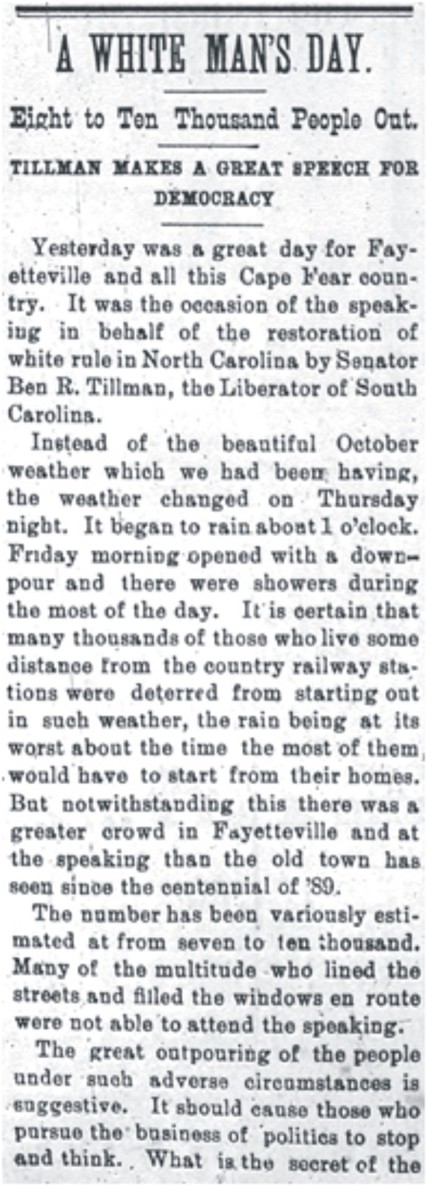
Figure 6.5
www.ck12.org
90
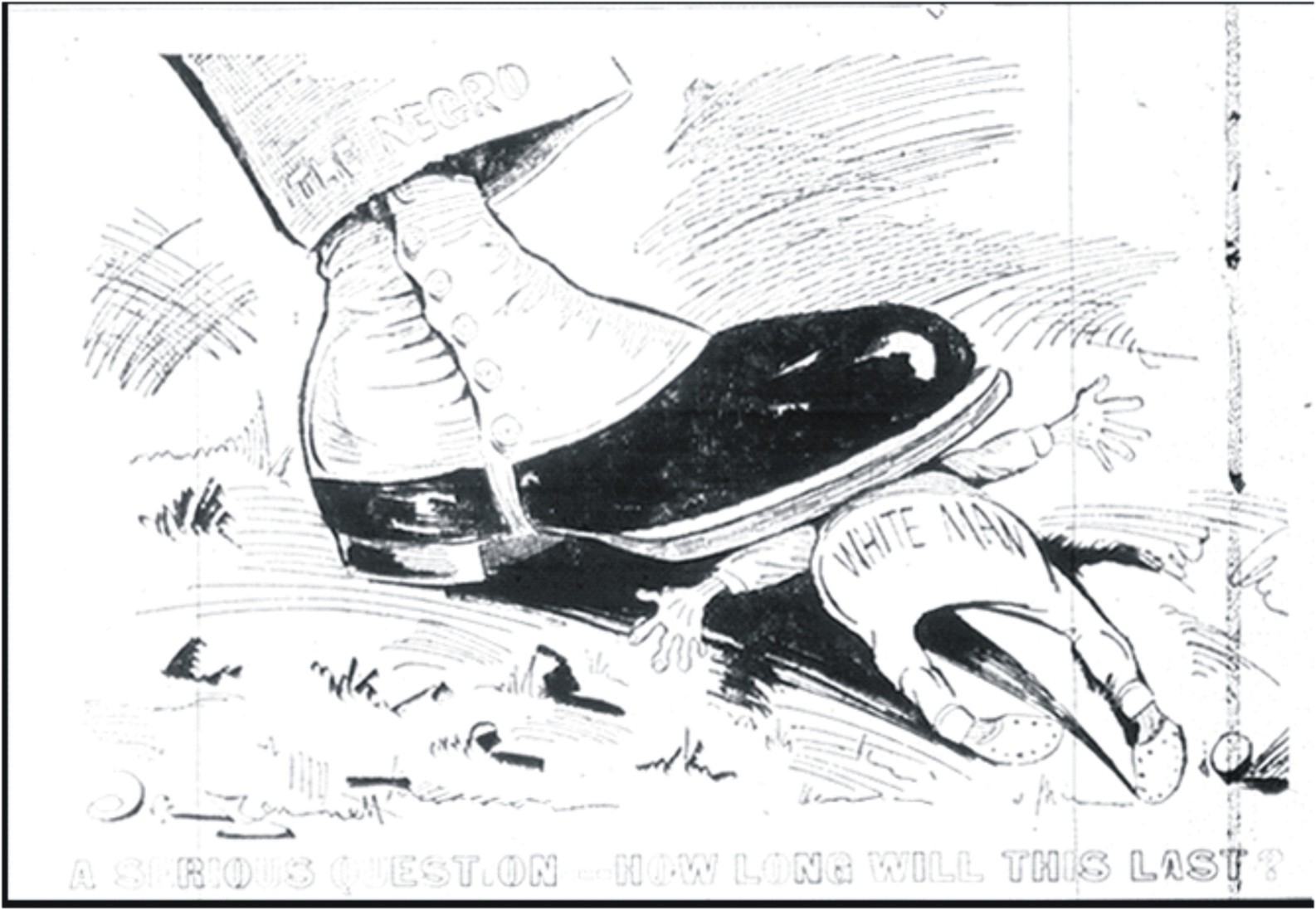
Figure 6.6: Pant leg is labeled, “THE NEGRO.” Figure being stepped upon is labeled, “WHITE MAN.”
“A SERIOUS QUESTION –HOW LONG WILL THIS LAST?”
actually destroyed, and citizens fired on, that several citizens have been taken from their homes
at night and whipped; that in several counties peaceful citizens have been intimidated and
terrorized by threats of violence to their persons and their property, until they remove their
names from the voter registration.
Therefore, I, Daniel L. Russell, Governor of the State of North Carolina, by virtue of authority
vested in me by the Constitution and laws, will use all lawful efforts








